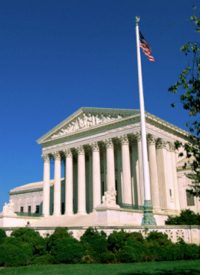
You win some; you lose some. In October, a federal judge in Michigan dismissed a lawsuit challenging ObamaCare’s individual mandate, arguing that Congress has the power to impose such a mandate under the Commerce Clause. A week later a federal judge in Florida permitted a similar lawsuit to proceed because he believed that the individual mandate stretched the Commerce Clause beyond the breaking point, saying that for him it “is not even a close call.” A Virginia federal judge had previously permitted another lawsuit to proceed on similar grounds.
On November 30, U.S. District Judge Norman K. Moon, an appointee of President Bill Clinton who is seated in Lynchburg, Virginia, dismissed a lawsuit brought by Liberty University arguing, among other things, that the individual and employer mandates are unconstitutional and that the employer mandate could force the university to subsidize abortion coverage.
A plain reading of the Constitution would indicate that Congress is nowhere empowered to force individuals or employers to purchase health insurance (or any other product or service). The Commerce Clause merely grants Congress the authority “to regulate commerce … among the several states,” which James Madison, the Father of the Constitution, took to mean that Congress should keep commerce “regular” among the states. This, Judge Andrew Napolitano argues, implied that the federal government was to “prevent ruinous state-imposed tariffs that favored in-state businesses.”
Federal courts, however, long ago discarded the plain meaning of the Constitution in favor of nebulous “emanations” and “penumbras,” as in one famous precedent cited by Moon, Wickard v. Filburn (1942). In Wickard the Supreme Court held that a farmer could be penalized for growing wheat for his own consumption beyond the quotas imposed by the Agricultural Adjustment Act because by using his own wheat rather than buying it from others he was exerting “a substantial economic effect on interstate commerce.” Wickard and similar rulings expanded the meaning of the Commerce Clause from simply preventing interstate trade barriers to micromanaging every human activity that could possibly be construed as “affecting” interstate commerce.
Liberty argued that the ObamaCare individual mandate penalizes people for inactivity, that is, the act of not buying health insurance, which would not seem to be commerce in any meaningful sense. (The plaintiffs further characterized it — accurately — as penalizing individuals for “simply existing.”) Moon, relying on Wickard, Gonzales v. Raich (2005), and similar precedents, dismissed this argument:
The conduct regulated by the individual coverage provision — individuals’ decisions to forego purchasing health insurance coverage — is economic in nature…. Nearly everyone will require health care services at some point in their lifetimes, and it is not always possible to predict when one will be afflicted by illness or injury and require care…. Regardless of whether one relies on an insurance policy, one’s savings, or the backstop of free or reduced-cost emergency room services, one has made a choice regarding the method of payment for the health care services one expects to receive. Far from “inactivity,” by choosing to forego insurance, Plaintiffs are making an economic decision to try to pay for health care services later, out of pocket, rather than now, through the purchase of insurance. As Congress found, the total incidence of these economic decisions has a substantial impact on the national market for health care by collectively shifting billions of dollars on to other market participants and driving up the prices of insurance policies.
Since the court found in Wickard that “economic activity subject to regulation under the Commerce Clause need not involve transacting business in the marketplace,” Moon explained, the fact that choosing not to buy insurance “directly affect[s] the price of insurance in the market” means that Congress has every right to penalize such a decision. He argued, similarly, that “the terms of health coverage offered by employers to their employees have substantial effects cumulatively on interstate commerce” and that Congress, therefore, has a right to mandate the existence and terms of such coverage.
Moon also dismissed the plaintiffs’ claim that ObamaCare could force pro-life persons to subsidize abortion coverage on the grounds that the healthcare law “contains strict safeguards at multiple levels to prevent federal funds from being used to pay for abortion services.” One of those “strict safeguards” cited by Moon is President Obama’s executive order banning federal funding of abortion under ObamaCare. Yet both pro-life and pro-abortion forces agreed from the outset that the order (a) does not cover all the provisions of the act, leaving open the possibility of federal funding of abortion under lesser-known portions of the law, and (b) may not even be enforceable in court. Furthermore, some state high-risk pools, which are federally funded, have indicated that they could cover abortions. Given the uncertainty at this time, this matter may, unfortunately, have to wait until the federal government starts funding abortion coverage before it can be successfully challenged in court.
This is not the end of this lawsuit. Liberty plans to appeal, an option made easier by the fact that Moon “found that [the university] had legal standing to bring its lawsuit, and that the case was ready for trial,” according to the Lynchburg News & Advance. Meanwhile, the Florida case and the other Virginia case (brought by the state’s Attorney General) are proceeding. Ultimately, the Supreme Court will probably end up ruling on one or more of these cases; and since it is the court that created this Commerce Clause mess, affirming it as recently as 2005 in Raich, how the justices will rule on ObamaCare is anybody’s guess.



